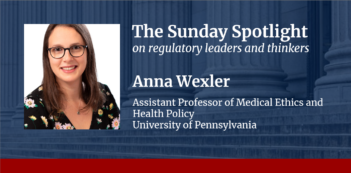
Scholar argues that FDA can, and should, regulate marijuana edibles.
At an elementary school in New Mexico, a fifth-grader brought candy with her to school and shared it with her friends. The kids started feeling sick, complaining of dizziness and a sudden onset of the giggles.
The candy shared by the student was actually laced with tetrahydrocannabinol (THC)—the primary psychoactive ingredient found in marijuana.
Unfortunately, incidents of children accidentally bringing marijuana edibles—candies and other foods containing THC—has become more common. Each year police encourage parents to check their children’s Halloween candy to make sure it is not laced with the substance. Unfortunately, children in Canada, Maine, Colorado, and other locations have already fallen prey to the deceptive candy intended for adults.
Legal analyst Paul J. Larkin, Jr. says that these incidents are preventable and calls for regulatory action by the U.S. Department of Justice, the U.S. Food and Drug Administration (FDA), or both.
Currently, 33 states and the District of Columbia have some form of a comprehensive marijuana legislation and 10 of those states as well as D.C. have legalized marijuana for adult recreational use.
Advocates of marijuana legalization have asserted that criminalization limits patients’ access to marijuana’s medicinal properties for conditions like nausea and seizures, which can be especially beneficial for children.
Opponents argue that marijuana can be harmful for adults and is much more dangerous for children. In children, “THC is likely to have adverse physical and mental health effects that would not occur in an adult, or even if they did, would not be present to the same degree,” Larkin argues.
To help limit minors’ access to marijuana, Larkin outlines two different approaches that the Justice Department and FDA could take to regulate edibles: an “aggressive” or “cautious” approach.
The aggressive approach would involve both agencies enforcing “federal law in every fashion that the federal code allows.” This approach, Larkin writes, would amount to a “full-bore attack” on the manufacture, possession, and sale of medical and recreational marijuana in the states where it is legal.
Federal law enforcement officers, for example, could seize marijuana sold online or through dispensaries and arrest those who played a “material role” in its distribution.
The Justice Department could prosecute businesses involved in marijuana distribution under federal controlled substance laws like the Controlled Substances Act (CSA), which “schedules” drugs based on factors like the drug’s potential for abuse. The CSA currently lists marijuana as a Schedule I drug—one with a high potential for abuse and no accepted medical use—along with others like heroin and ecstasy.
The Justice Department could even go as far as to pursue secondary offenses like money laundering or racketeering under the Money Laundering Control Act of 1986 and the Racketeer Influenced and Corrupt Organizations Act, respectively.
FDA’s role would involve the wholesale “seizure of marijuana edibles on the ground that they are adulterated and misbranded foods.” This power, Larkin argues, would come from the Federal Food, Drug, and Cosmetic Act (FDCA).
The FDCA classifies food as “adulterated” if it contains any added “poisonous or deleterious substance which may render it injurious to health.” Larkin suggests that marijuana edibles would fit this description because, aside from pesticides and other toxins, edibles contain THC, a potentially dangerous substance.
But Larkin cautions against such an aggressive approach because it could lead to political conflict where the states and member of Congress are on one side of the issue and the executive branch is on the other. Because more than 40 states, including D.C., have legalized marijuana or one of its “constituents” for medical purposes, states would likely receive support from a large majority of the members of Congress.
Many states, such as Colorado, have also established state bodies to regulate marijuana. Although federal law enforcement officers may be willing to “shut down the private retail sale of marijuana,” Larkin argues that federal law enforcement officers will be reluctant to prosecute state officials if they are following their state’s laws. Federal law enforcement officers know that federal law enforcement agencies, like the U.S. Secret Service or the U.S. Drug Enforcement Administration, occasionally partner with state and local departments, so states and localities may decline to assist these federal agencies if their state officials are being prosecuted in the course of performing their jobs.
Because of the potentially catastrophic effects of the aggressive approach, Larkin suggests a more cautious approach. He recommends using a more targeted focus rather than a wholesale attack.
Using this approach, the Justice Department would focus solely on state laws which authorize the “recreational use of marijuana.” Narrowed even further, the Justice Department could concentrate specifically on edibles and the detriment they pose to minors, especially those edibles that “closely resemble” candy.
In addition, instead of prosecuting under the CSA, the Justice Department could enlist help from FDA to seize adulterated edibles.
FDA could use its power under the FDCA to declare that “the addition of THC to any edible renders the product ‘adulterated.’” FDA could then seize those products. One complication, of course, is that such action by FDA could reduce the supply of THC edibles and drive more people to smoke marijuana, which could be a more dangerous practice.
Instead of declaring marijuana edibles “adulterated,” Larkin says that FDA could forbid the sale of edibles that are easily confused with a “legitimate baked good, candy, or anything similar.” Packaging on edibles could also be modified to reduce the risk that minors would consume the product. Those requirements could include child-proof packaging and clear warning labels.
Regardless of the route regulators take, Larkin calls for action to keep marijuana edibles away from children.



